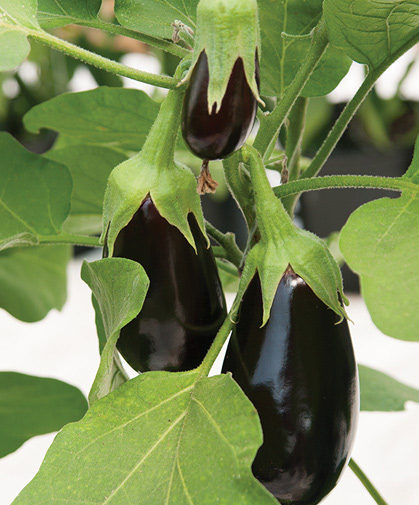Eggplant - Key Growing Information

CULTURE: Eggplants require fertile, well-drained soil with a pH range of 6.2-6.8. Sow seed in flats indoors during early spring, or 6-8 weeks prior to planting outdoors. Sow 4 seeds/in., ¼" deep, and maintain soil temperature at 80-90°F (27-32°C) until emergence and 70°F (21°C) thereafter. Seed will not germinate in cool soil. After true leaves form, thin to 2-3" apart in flats or transplant into 2-3" pots or plug trays. To harden plants, reduce water and temperature to about 60°F (16°C) for about a week before planting out. Transplant outdoors late spring or early summer once the weather has thoroughly settled. Eggplants are tender, and cold weather may weaken them. Use row covers for a boost in performance and insect control. Remove when plants reach the covers or when blossoms first appear. Space transplants 18" apart in rows 30-36" apart, or 2 rows on plastic mulch, 18-24" between plants. It is important to be mindful of over-fertility. Too much nitrogen often results in large, bushy plants that produce only one small set of fruit.
STAKING: Eggplants may be pruned and staked to keep the fruits straight.
DISEASE: Practice lengthy crop rotation to avoid Verticillium wilt. A 4-5 year rotation for all Solanaceae crops is recommended.
INSECT PESTS: Fabric row covers are the recommended method of control for flea beetles and Colorado potato beetles (CPB) for newly set transplants. Once covers are removed, regularly check undersides of leaves and crush any orange egg masses of the CPB.
HARVEST: Clip fruit stem with shears. Pick fruits of desired size regularly to encourage further production.
DAYS TO MATURITY: From transplanting.
TRANSPLANTS: Avg. 800 plants/1,000 seeds.
SEED SPECS: SEEDS/OZ.: 6,500–8,400 (avg. 7,300).
PACKET: 25 seeds.
